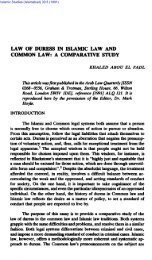ORPHANED GRANDCHILDREN IN ISLAMIC SUCCESSION LAW
ORPHANED GRANDCHILDREN IN ISLAMIC SUCCESSION LAW
ORPHANED GRANDCHILDREN IN ISLAMIC SUCCESSION LAW
You also want an ePaper? Increase the reach of your titles
YUMPU automatically turns print PDFs into web optimized ePapers that Google loves.
<strong>ORPHANED</strong><strong>GRANDCHILDREN</strong> <strong>IN</strong> <strong>ISLAMIC</strong> <strong>SUCCESSION</strong> <strong>LAW</strong> 273<br />
heirs (let alone legacies) and seriously disturbs the rights of the<br />
other heirs inter se even those of the "fixed" Qur'anic sharers. All<br />
this is, of course, in addition to the total violation of the deceased's<br />
last testamentary wishes which Islam considers to be of the<br />
highest religious merit when they are for certain purposes and<br />
within the bequeathable limit of one-third of the net estate.<br />
The principle of representation, however sparingly used in the<br />
classical system, is nevertheless not unknown there and this princi-<br />
ple, whatever its implications, is necessary for the application of<br />
the 1946 Law as much as for the 1961 Law. This is so whichever<br />
method is adopted for applying the 1946 Law. There are three<br />
such methods that have been used or suggested, two of them<br />
leading to violations in practice of the provisions of the 19% Law<br />
itself (which provisions cannot be dropped from the 1946 Law<br />
without destroying the fiction that a legacy has been created), while<br />
the third method by also disturbing the rights of the heirs inter se<br />
shows the true nature of the 1946 Law, of dealing not with legacies<br />
but concealed inheritance portions.<br />
If the strengthening of the agnatic family in its direct lineal<br />
order from generation to generation is an enduring Islamic family<br />
ideal, then the 1961 Law is fully in harmony with this. In contrast,<br />
the 1946 Law hesitates to commit itself as to the orphaned grand-<br />
child's status within the family and, as a result, finds itself in a series<br />
of contradictions which obtrude in the controversy as to which<br />
of the three methods should be adopted for applying it, by the<br />
consequences of trying to cloak an inheritance portion as a legacy<br />
and by the erratic results it produces, sometimes being based on the<br />
bequeathable one-third, sometimes on the predeceased parent's<br />
share and at other times on amounts provided in intestacy under<br />
classicaI law.<br />
NOTES<br />
1. See e.g. IX : 24, where the prior claims of Islam over the family are asserted.<br />
2. IV : 7-12 read with IV : 177.<br />
3. 41j'YI literally means only a "close" relative. which, of course, further<br />
strengthens the foregoing arguments.<br />
4. See one reference in IV : 11 and two in IV : 12.<br />
5. In addition there are invalid legacies e.g. to a gambling casino.<br />
6. This is particularly true of direct male descendants ; descendants through a<br />
female having entered. by this generation, another family grouping altogether.<br />
7. Thesedivergences of classical law from the exclusion rule were pointed out<br />
by the author in his booklet Islamic Family Law in Pakistan (Karachi. 1964)
















